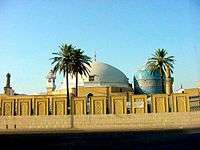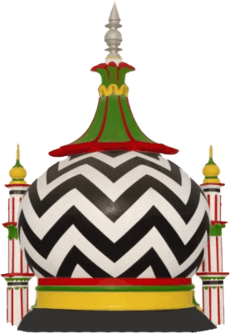Mustafa Raza Khan Qadri
| Mustafa Raza Khan Qadri Nori | |
|---|---|
| Title | Sheikh, |
| Born |
26th Zil Hajj 1310 AH (18 July 1892) Bareilly |
| Died | Bareilly |
| Era | Modern |
| Religion | Islam |
| Jurisprudence | Hanafi |
|
Influenced by
| |
Mustafa Raza Khan Qadri, also known as Mufti-e-Azam-e-Hind (Grand Jurist of India), was a significant Muslim scholar. He was born Monday, 22nd of Zil Hijjah 1310 AH (18 July 1892) in the city of Bareilly Shareef, India. Khan was the son of the Islamic scholar Ahmed Raza Khan.[1] He wrote several books on Islam in Arabic, Urdu, Persian, Hindi and announced judgments on several thousand Islamic problems in his compilation of Fatawa Fatawa-e-Mustafwia. Thousands of Islamic scholars were counted as his spiritual successors.[2] Due to his popularity and knowledge, the Barelwi movement accepted him as its leader after the death of Ahmed Raza Khan. He was the main leader of All India Jamaat Raza-e-Mustafa[3] in Bareilly city which initiated counter to Shuddhi Movement to save Muslims from being converted into Hinduism in undivided India.[2][4] During the time of emergency in India, he issued a fatwa against vasectomy and refuted then Prime Minister Indira Gandhi.[5][6]
Life
His First Fatawa
Mufti-e-Azam-e-Hind, Maulana Mustafa Raza Khan brilliance as an Islamic Scholar manifested itself when he was a still a youth, but overflowing with knowledge and wisdom. He wrote his first historical Fatawa (Islamic Ruling) when he was only 13 years old. It dealt with the topic of "Raza'at" - affinity between persons breast fed by the same woman. After this Mufti-e-Azam-e-Hind, Maulana Mustafa Raza Khan spent another 12 years writing Fatawas at the feet of AalaHazrat. He was given this immense responsibility of issuing Fatawas even while AalaHazrat was in this physical world. He continued this trend until his last breath. The stamp which was given to him was mislaid during his second Hajj when his bags were lost.[7]
Character and Habits
Mufti-e-Azam-e-Hind, Maulana Mustafa Raza Khan possessed great heights of good character, moral standards, kindness, sincerity, love and humbleness. He never refused the invitation of any poor Muslim. He always stayed away from those who were very wealthy and lavish. He was the possessor of great moral and ethical values. It is stated that once Akbar Ali Khan, a Governor of U.P., came to visit Mufti-e-Azam-e-Hind. Mufti-e-Azame-Hind did not meet him but left to a place called Puraana Shahar (Old City) to visit a poor Sunni Muslim who was very ill and at the doorstep of death. On another occasion, Fakhruddeen Ali Ahmad, the President of India, came to visit Mufti-e-Azam-e-Hind but was refused this opportunity.[7]
Works
Books & Treaties
Mufti-e-Azam-e-Hind, Maulana Mustafa Raza Khan was a great Muhaqqiq (Philosopher) and Musannif (Author). His writings were filled with the rays of knowledge of his distinguished father, AalaHazrat, Ash Shah Imam Ahmed Raza Khan Al Qaderi. All his works displayed great research. It seemed as if his works were overflowing with the "research of Imam Ghazzali, the rareness of Imam Raazi and the rays of knowledge of Imam Jalaluddeen Suyuti ". Mufti-e-Azam-e-Hind wrote a number of books in his blessed lifetime:[8]
- Fatawa-e-Mustafwia (Judgments of Mustafa Raza)
- Al Malfoozat of Ala Hazrat (Sayings of Ahmed Raza Khan)
- Saman-e-Bakhshish (Compilation of Islamic Poetry in the Honor of Prophet Muhammad)[9]
- Taqiya Baazi (Hidden faces of Wahabism)
- Waqat-us-Sinan، Adkhal-us-Sinan، Qahr Wajid Diyan
- Turq-ul-Huda Wal Irshad Ilaa Ahkam Al Amara Wal Jehad
- Tasheeh Yaqeen Bar Khatm-e-Naiyeeen
- No Caste is Inferior
His Death
Mustafa Raza Khan was aware of the actual time of his Wisaal. On the 6th of Muharram (1981) he said, "All those who intended to become my Mureed but for some reason or the other could not come to me, I have made all of them Mureed and I have given their hands into the hand of Sayidduna Ghousul Azam. " On the 12th of Muharram (1981) Hazrat said, " All those who asked me to make Dua for them, I have made Dua for their Jaiz (permissble) intentions to be fulfilled. May Allah accept this Dua." On this day he asked those that were present concerning date. They told him that it was the 12th of Muharram. On hearing this he became silent. On the 13th of Muharram, he again asked concerning the date and the Mureedeen present said that it was Wednesday, the 13th of Muharram. On hearing this Mufti-e-Azam-e-Hind said, "Namaaz will be held at Nau Mahla Musjid". Those present did not understand what he meant, but remained silent out of respect. After some time again Mufti-e-Azam-e-Hind said, "Did anybody tell you about the Namaaz? I will read Jumma Namaaz in Nau Mahla Masjid." After some time Hazrat said, "Did anybody say anything about the Fatiha." Those present just gazed at each other's faces and remained silent. Only later did they realise what Mufti-e-Azam-e-Hind was implying. Hazrat was spiritally present for Jummah at the Nau Mahla Masjid! Mufti-e-Azam-e-Hind was not only giving hope to the Mureedeen but also informing them of his Wisaal. The shining star of Aala Hazrat, Ash Shah Imam Ahmed Raza Khan, the glitter and the hope for the hearts of millions throughout the world, the Mujaddid of the 15th Century, the Imam of his time, Huzoor Sayyidi Sarkaar Mufti-e- Azam-e-Hind left the Aalame Duniya to Journey towards the Aalame Aakhira. It was 1.40 p.m. on the eve of the 14th of Muharram 1402 AH (1981).
See also
References
- ↑ Usha Sanyal. Generational Changes in the Leadership of the Ahl-e Sunnat Movement in North India during the Twentieth Century. Modern Asian Studies (1998), Cambridge University Press.
- 1 2 Ridgeon, L. (2015). Sufis and Salafis in the Contemporary Age. Bloomsbury Publishing. p. 187. ISBN 9781472532237. Retrieved 2015-07-28.
- ↑ "JRM". jamatrazaemustafa.org. Retrieved 2015-07-28.
- ↑ Hasan, M.; Jamia Millia Islamia (India). Dept. of History (1985). Communal and pan-Islamic trends in colonial India. Manohar. Retrieved 2015-07-28.
- ↑ Arun Shourie, The World of Fatwas or the Sharia in Action, pg. 135. ASA Publications, 1995. ISBN 9788190019958
- ↑ "Shajrah-E-Muqad'das of the Silsila Aaliyah Qaaderiyah Barakaatiyah Radawiyyah" (PDF). 11 April 2011. Retrieved 2015-07-28.
- 1 2 "Hazrat Muhammed Mustafa Raza Khan (رضي الله عنه) | Aulias World". auliasworld.com. Retrieved 2015-07-28.
- ↑ "maulana mufti mustafa raza khan - Nafeislam.Com | Islam | Quran | Tafseer | Fatwa | Books | Audio | Video | Muslim | Sunni - Nafseislam.Com". books.nafseislam.com. Retrieved 2015-07-28.
- ↑ "Saman-e-Bakhshish - اسلامی شاعری و نعتیہ دیوان - - Sunni Library - Alahazrat Network". alahazratnetwork.org. Retrieved 2015-07-28.
External links
- Free Download Mustafa Raza Khan's Urdu Books
- Mustafa Raza Khan sent his disciples to serve Islam in South Africa
- Mustafa Raza Khan Qadri lead the Ahle Sunnat Movement
- Mufti Azam-e-Mustafa Raza Khan
- Institutions in his memory
- About Mustafa Rida Qadri


